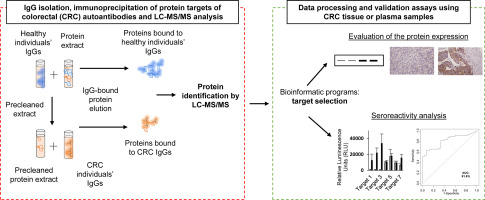当前位置:
X-MOL 学术
›
J. Proteomics
›
论文详情
Our official English website, www.x-mol.net, welcomes your feedback! (Note: you will need to create a separate account there.)
Identification of tumor-associated antigens with diagnostic ability of colorectal cancer by in-depth immunomic and seroproteomic analysis.
Journal of Proteomics ( IF 3.3 ) Pub Date : 2020-01-07 , DOI: 10.1016/j.jprot.2020.103635 María Garranzo-Asensio 1 , Pablo San Segundo-Acosta 2 , Carmen Povés 3 , María Jesús Fernández-Aceñero 4 , Javier Martínez-Useros 5 , Ana Montero-Calle 1 , Guillermo Solís-Fernández 1 , Maricruz Sanchez-Martinez 1 , Nuria Rodríguez 6 , María Ángeles Cerón 4 , Servando Fernandez-Diez 3 , Gemma Domínguez 7 , Vivian de Los Ríos 8 , Alberto Peláez-García 9 , Ana Guzmán-Aránguez 10 , Rodrigo Barderas 1
Journal of Proteomics ( IF 3.3 ) Pub Date : 2020-01-07 , DOI: 10.1016/j.jprot.2020.103635 María Garranzo-Asensio 1 , Pablo San Segundo-Acosta 2 , Carmen Povés 3 , María Jesús Fernández-Aceñero 4 , Javier Martínez-Useros 5 , Ana Montero-Calle 1 , Guillermo Solís-Fernández 1 , Maricruz Sanchez-Martinez 1 , Nuria Rodríguez 6 , María Ángeles Cerón 4 , Servando Fernandez-Diez 3 , Gemma Domínguez 7 , Vivian de Los Ríos 8 , Alberto Peláez-García 9 , Ana Guzmán-Aránguez 10 , Rodrigo Barderas 1
Affiliation

|
Colorectal cancer (CRC) is the third most common cancer and the second leading cause of cancer related death worldwide. Its diagnosis at early stages would significantly improve the survival of CRC patients. The humoral immune response has been demonstrated useful for cancer diagnosis, predating clinical symptoms up to 3 years. Here, we employed an in-depth seroproteomic approach to identify proteins that elicit a humoral immune response in CRC patients. The seroproteomic approach relied on the immunoprecipitation with patient-derived autoantibodies of proteins from CRC cell lines with different metastatic properties followed by LC-MS/MS. After bioinformatics, we focused on 31 targets of CRC autoantibodies. After WB and IHC validation, ERP44 and TALDO1 showed potential to discriminate disease-free and metastatic CRC patients, and time to recurrence of CRC patients in stage II. Using plasma samples of 30 healthy individuals, 28 premalignant individuals, and 32 CRC patients, nine out of 13 selected targets for seroreactive analysis showed significant diagnostic ability to discriminate either CRC patients or premalignant subjects from controls. Our results suggest that the here defined panel of CRC autoantibodies and their target proteins should be included in CRC blood-based biomarker panels to get a clinically useful blood-based diagnostic signature for CRC detection. SIGNIFICANCE: Colorectal cancer is one of the deadliest cancer types mainly due to its late diagnosis. Its early diagnosis, therefore, is of great importance since it would significantly improve the survival of CRC patients. In our work, the in-depth seroproteomic analysis of colorectal cancer using isolated IgGs from colorectal cancer patients and controls and protein extract of colorectal cancer cells provide the identification of valuable biomarkers with diagnostic and prognostic ability of the disease.
中文翻译:

通过深入的免疫和血清学分析鉴定具有大肠癌诊断能力的肿瘤相关抗原。
大肠癌(CRC)是全球第三大常见癌症,也是与癌症相关的死亡的第二大主要原因。其早期诊断将显着提高CRC患者的生存率。体液免疫反应已被证明可用于癌症诊断,早于3年的临床症状。在这里,我们采用了一种深层的血清学方法来鉴定引起CRC患者体液免疫反应的蛋白质。血清学方法依赖于来自患者的具有不同转移特性的CRC细胞系蛋白的自身抗体进行免疫沉淀,然后进行LC-MS / MS。经过生物信息学研究后,我们重点研究了CRC自身抗体的31个靶标。经过WB和IHC验证后,ERP44和TALDO1显示出区分无病和转移性CRC患者的潜力,以及第二阶段CRC患者的复发时间。使用30位健康个体,28位癌变前个体和32位CRC患者的血浆样本,从13个选定的目标进行血清反应分析中,有9个显示出显着的诊断能力,可将CRC患者或癌前个体与对照区分开。我们的结果表明,此处定义的CRC自身抗体及其靶蛋白应包含在CRC血液基生物标志物中,以获取临床上有用的基于血液的CRC诊断签名。意义:大肠癌是最致命的癌症类型之一,主要是由于其诊断晚。因此,其早期诊断非常重要,因为它将大大提高CRC患者的生存率。在我们的工作中
更新日期:2020-01-07
中文翻译:

通过深入的免疫和血清学分析鉴定具有大肠癌诊断能力的肿瘤相关抗原。
大肠癌(CRC)是全球第三大常见癌症,也是与癌症相关的死亡的第二大主要原因。其早期诊断将显着提高CRC患者的生存率。体液免疫反应已被证明可用于癌症诊断,早于3年的临床症状。在这里,我们采用了一种深层的血清学方法来鉴定引起CRC患者体液免疫反应的蛋白质。血清学方法依赖于来自患者的具有不同转移特性的CRC细胞系蛋白的自身抗体进行免疫沉淀,然后进行LC-MS / MS。经过生物信息学研究后,我们重点研究了CRC自身抗体的31个靶标。经过WB和IHC验证后,ERP44和TALDO1显示出区分无病和转移性CRC患者的潜力,以及第二阶段CRC患者的复发时间。使用30位健康个体,28位癌变前个体和32位CRC患者的血浆样本,从13个选定的目标进行血清反应分析中,有9个显示出显着的诊断能力,可将CRC患者或癌前个体与对照区分开。我们的结果表明,此处定义的CRC自身抗体及其靶蛋白应包含在CRC血液基生物标志物中,以获取临床上有用的基于血液的CRC诊断签名。意义:大肠癌是最致命的癌症类型之一,主要是由于其诊断晚。因此,其早期诊断非常重要,因为它将大大提高CRC患者的生存率。在我们的工作中



























 京公网安备 11010802027423号
京公网安备 11010802027423号